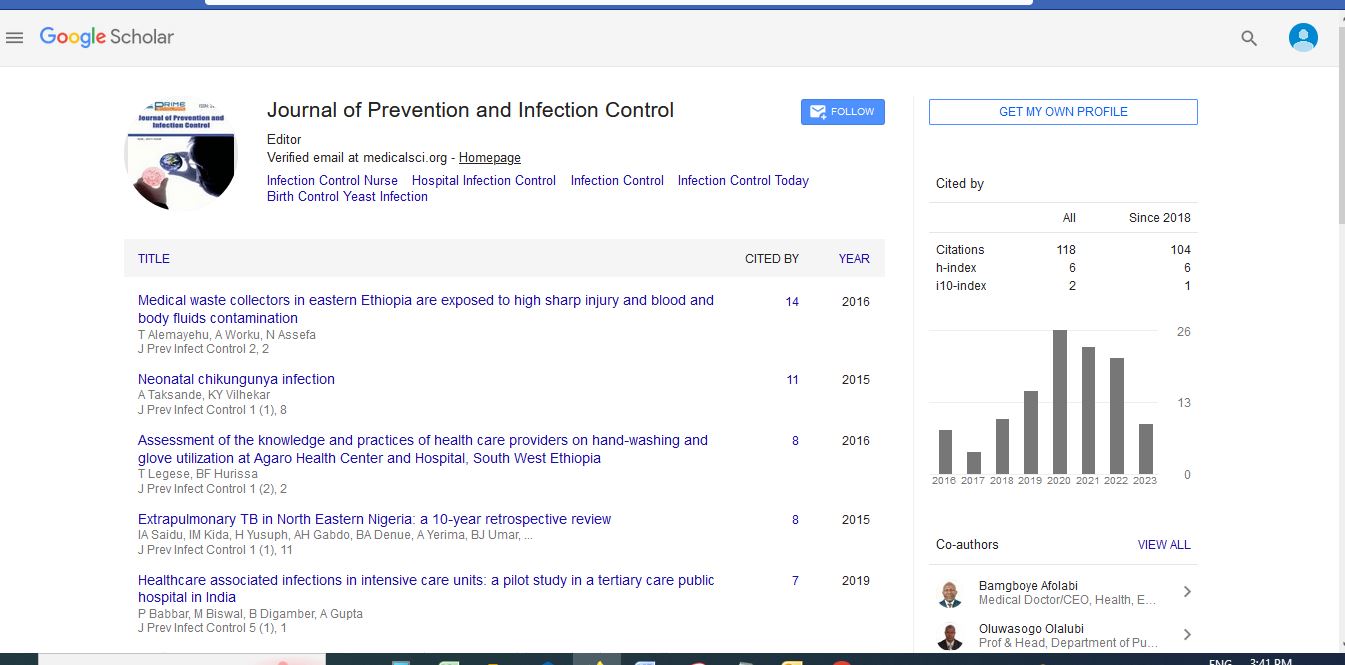Commentary - (2024) Volume 10, Issue 3
The Essential Role of Cleanliness in Daily Life
Jun Sun*
Department of Medical Science, Nanjing University, China
*Correspondence:
Jun Sun,
Department of Medical Science, Nanjing University,
China,
Email:
Received: 02-Sep-2024, Manuscript No. IPJPIC-24-21350;
Editor assigned: 04-Sep-2024, Pre QC No. IPJPIC-24-21350 (PQ);
Reviewed: 18-Sep-2024, QC No. IPJPIC-24-21350;
Revised: 23-Sep-2024, Manuscript No. IPJPIC-24-21350 (R);
Published:
30-Sep-2024, DOI: 10.36648/2471-9668-10.3.25
Description
Cleanliness is often described as next to godliness, and for good
reason. It extends beyond mere tidiness and touches every
aspect of our daily lives, influencing our health, productivity,
and overall well-being. As society progresses, the importance
of cleanliness becomes increasingly evident, emphasizing its
integral role in maintaining a high quality of life. One of the
most significant aspects of cleanliness is its impact on health. A
clean environment reduces the risk of infections and illnesses.
Regular cleaning and disinfecting surfaces eliminate germs and
bacteria that can lead to respiratory infections, food poisoning,
and other health issues. For instance, washing hands frequently
with soap and water is one of the simplest and most effective
ways to prevent the spread of diseases. In addition to personal
hygiene, cleanliness in public spaces plays a crucial role in public
health. Hospitals, schools, and public transportation systems
all require rigorous cleaning protocols to prevent the spread of
infections. The COVID-19 pandemic underscored this necessity,
highlighting how cleanliness practices can significantly reduce
the transmission of viruses. Cleanliness also affects mental and
emotional well-being. A cluttered and dirty environment can
contribute to stress and anxiety, making it harder to focus and
be productive. Studies have shown that people who live in clean,
organized spaces tend to experience less stress and feel more
in control of their lives. The act of cleaning and organizing can
itself be therapeutic, providing a sense of accomplishment and
order. Creating a clean and organized space can also improve
sleep quality. A tidy bedroom free from clutter can foster a more
restful environment, leading to better sleep and overall health.
Conversely, a disorganized and messy bedroom can contribute
to restless nights and increased stress. The relationship
between cleanliness and productivity is well-documented. A
clean workspace enhances focus and efficiency. For businesses,
this means fewer distractions and more effective use of time.
Employees in well-maintained environments are generally more
satisfied and motivated, leading to increased productivity and
job satisfaction. In educational settings, cleanliness is equally
vital. A clean classroom environment promotes better learning
conditions. Students are less likely to be distracted or fall ill,
which contributes to better academic performance and a more
positive school experience. Cleanliness also reflects social and
environmental responsibility. Proper waste management and
recycling contribute to a healthier planet by reducing pollution
and conserving resources. Adopting environmentally friendly
cleaning practices, such as using biodegradable products and
minimizing water use, helps mitigate environmental impact. On a
social level, cleanliness fosters a sense of respect and community.
Maintaining clean public spaces and participating in local cleanup
efforts demonstrate a commitment to collective well-being.
It encourages a culture of care and consideration, benefiting
everyone in the community. Maintaining cleanliness requires
consistent effort and habits. Establishing daily routines, such
as regular cleaning schedules and personal hygiene practices,
helps sustain a clean environment. It’s also important to educate
and involve others in these practices, whether at home, work,
or in public spaces. In summary, cleanliness is a cornerstone
of a healthy, productive, and fulfilling life. Its benefits extend
from personal health and mental well-being to societal and
environmental impacts. By prioritizing cleanliness in our daily
routines and communities, we contribute to a better quality of
life for ourselves and those around us. In the end, cleanliness is
not just about appearance; it’s about fostering a healthier, more
harmonious world.
Acknowledgement
None.
Conflict Of Interest
None.
Citation: Sun J (2024) The Essential Role of Cleanliness in Daily Life. J Prevent Infect Control. 10:25.
Copyright: © 2024 Sun J. This is an open-access article distributed under the terms of the Creative Commons Attribution License, which permits unrestricted use, distribution, and reproduction in any medium, provided the original author and source are credited.

